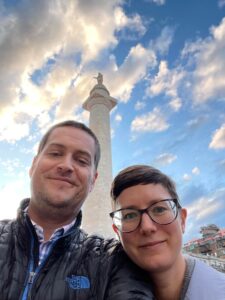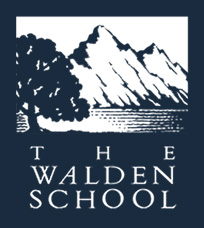In the Spotlight
Sam Pluta and Sky Macklay
 Sam Pluta is a composer, laptop improviser, electronics performer, and sound artist who was on faculty at Walden for 16 summers. Though his work has a wide breadth, his central focus is on using the computer as a performance instrument capable of sharing the stage with groups ranging from new music ensembles to world-class improvisers. Sam is the Technical Director for the Wet Ink Ensemble, a group for which he is a member composer as well as principal electronics performer. He studied composition and electronic music at Columbia University, where he received his DMA in 2012.
Sam Pluta is a composer, laptop improviser, electronics performer, and sound artist who was on faculty at Walden for 16 summers. Though his work has a wide breadth, his central focus is on using the computer as a performance instrument capable of sharing the stage with groups ranging from new music ensembles to world-class improvisers. Sam is the Technical Director for the Wet Ink Ensemble, a group for which he is a member composer as well as principal electronics performer. He studied composition and electronic music at Columbia University, where he received his DMA in 2012.
Sky Macklay is a composer, oboist, and installation artist who was on faculty at Walden for nine summers. Her music is conceptual yet expressive, exploring extreme contrasts, surreal tonality, audible processes, humor, and the physicality of sound. As a 2021 Guggenheim Fellow, her next project is a chamber music album that will synthesize her work as a composer and her raucous, multiphonic-rich oboe performance practice. She is a founding member of the New York-based Ghost Ensemble. Macklay completed her DMA in composition at Columbia University.
In the last year, Sky and Sam have taken up teaching positions at the Peabody Institute of Johns Hopkins University in Baltimore, continuing a long and deep association between Peabody, The Walden School, and the Junior Conservatory Camp (JCC), Walden’s predecessor program. JCC founder Grace Newsom Cushman, along with Walden co-founders Pam Quist, David Hogan, and Lynn Taylor Hebden, each enjoyed a long association with Peabody, and hundreds of Walden and JCC alumni first learned of JCC and Walden while studying music at the Peabody Prep. For many decades, there was a bus that left Peabody early in the morning on the last Saturday of June, filled with eager campers bound for New England to kick off each amazing summer of Walden (and perhaps JCC, too?).
How and when did your relationship with Walden begin, and what has been your involvement since then?
Sam: My relationship with Walden started in 2001 when I was on staff just after finishing college. In 2002, I was hybrid staff and faculty, and then from 2004 to 2016 I was on faculty at YMP. I was also Director of Computer Music at YMP from 2008 to 2016, and Academic Dean for at least 5 years until 2016. I was one of the founding faculty members of the Creative Musicians Retreat (CMR) in 2012, and on faculty at CMR for five years. When I was teaching at the University of Chicago, the quarter system made it impossible for me to do CMR, but now I’ll be back teaching at CMR this summer.
Sky: My relationship with Walden began in 2009 when I attended the Teacher Training Institute (TTI), and I absolutely loved it! I applied to be on faculty at Walden’s Young Musicians Program (YMP) the next year and got the job, and I was a faculty member at YMP from 2010 to 2018. I have also been on staff and a participant at CMR. I haven’t been on faculty for a few years now, but it’s my dream to teach at Walden again in the future.
Could you describe a favorite memory from your time at Walden?
Sky: One of my favorite parts of Walden is open mic night. I would host open mic nights a lot, and it was just such a wonderful time for everyone to share their creativity. One open mic night coincided with Christmas in July, and a YMP student named Evan Johnson [a 2022 YMP staff member] was my Secret Santa. For my present he gave me a really beautiful song that he wrote about me and Sam, so Sam and I danced to it at the open mic, but Sam was wearing Santa makeup, and the Santa makeup got all over my face while we were dancing!
Sam: Alex Christie [current YMP and CMR faculty and leadership team] wrote the Mountain Song almost 20 years ago, and the students still sing it whenever they hike Mt. Monadnock. It’s amazing to see a student get up to present something and you don’t know what it’s going to be, and then it’s something amazing that becomes part of the fabric of Walden, which will be passed down by generations of students.
Could you share some highlights from composing or performing in the last year?
Sky: I had a string quartet premiered by Kronos Quartet as part of the Bang on a Can Loud Weekend at Mass MoCA. I also made a new harmonica installation called Harmonitrees at Stetson University, and now I’ve integrated two of the trees into a new piece of chamber music called Harmonifriends with Ghost Ensemble, which was recently premiered at Uptown Underground in New York.
Sam: This weekend the double-bar bandit arrived and put the double bars on my piece for orchestra and electronics, called Seeker, for the Warsaw Autumn International Festival of Contemporary Music in September.
What are your current positions at Peabody?
Sam: I’m an associate Professor of Computer Music. At Peabody, composition and computer music are separate departments, but they’re both departments for composition, just with a different focus.
Sky: I’m a Lecturer in Composition. I mostly teach composition, and in the fall I’ll also be teaching a class called Composers of the AACM (Association of for the Advancement of Creative Musicians), which I’m really excited about. I’m also the composition coordinator for the low-residency master’s program, which is a new format that offers more flexibility for composers who may not be able to relocate for a master’s degree. It’s an intense summer experience, followed by two semesters of online classes, and then another intense summer experience. My Walden skills are especially helpful in creating an amazing summer festival experience and fostering a musical community in a short period of time.
How has Walden pedagogy informed your university teaching?
Sam: Part of the job in teaching is creating a community, creating situations where students get together to make music and teach each other. There’s nothing better than teaching for 16 years at Walden to make you understand how to foster community.
Sky: I take that same attitude from Walden, where composers forums provide a model for respectful dialogue involving composers and performers. I use creative musicianship and “Discover, Drill, Create” all the time in my composition lessons. If a student is stuck, I try to find a piece where we can discover something related to what they’re working on and create a drill based on it, which can help students get through creativity blocks and get the notes flowing.
Are there any reflections you could share on the Walden legacy at Peabody?
Sky: At Peabody, we are traversing the same halls as [JCC founder] Grace Cushman and a lot of Walden people including Steve Coxe, Leo Wanenchak, and Pam Quist. I recently came across an old Peabody newsletter that mentions a Walden alumna named Laura Kolker. It says she was a Peabody Prep student who won a BMI award and went to Walden four times, where she studied with Pam Quist, John Yankee, and Paul Nauert.
Sam: Pam Quist was the first person to teach electronic music at Walden, using tape-splicing equipment in the 1970s and ’80s. Pam learned that from Jean Eichelberger Ivey, who started electronic music at Peabody more than 50 years ago. So for me to bring my Walden pedagogy back to Peabody in the form of Walden’s Computer Musicianship course, which is the basis of all my electronic music teaching, that’s a pretty awesome circle!
Sky: For my Composers of the AACM class, I was researching the Schillinger method of composition, because one of the AACM composers, Muhal Richard Abrams, was a Schillinger practitioner. I believe the Schillinger method was an inspiration for some Walden and JCC teachers, including Grace Cushman. Joseph Schillinger was a composer who created a system involving algorithmic ways of generating rhythms and pitches. There’s a major Schillinger archive at Peabody, and the librarian who organized it was Ned Quist, who performed at Walden as part of Cross Country and wrote a beloved arrangement of “To My Old Brown Earth.”
